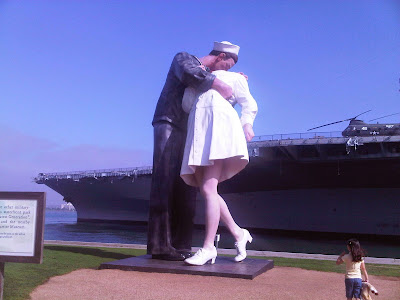 |
| Heterochromia |
In ports, along with....
[some hooker or stripper,
next to our half paranoid skipper,
dog Van Damme
was constantly chained....
One day it seemed to me
as if he complained
for his own ten-year brutal captivity.
and about the captain's insensitivity....
The unhappy dog showed love for me,
an unknown feeling to me, long at sea.
SOMEWHERE IN FAR EAST
The fierce clash of our ship
was for the psychopathic
[captain his last trip.
At the next port
[they fired the bastard home anyhow.
In the morning we saw
[with surprise at the bow
Van Damme abandoned and chained...
I was very very distressed and pained
because the ship owner
[decided to repatriate all the crew
and the news that the dog
[would be euthanized would be true...
He looked as if he understood the situation.....
I could not take anymore,
[and decided his salvation.
HOME
I think, I suppose, I trow
that Cathy does not know,
which one
[of Van Damme's two eyes
she likes most.....
but she really tries..
It's almost certain
she loves the black
but the other, the blue,
[makes her whack.
Α FEW DAYS LATER CATHY WROTE
Quietly and as he trained
an evening where it rained,
to annoy me refrained,
and in the sky he regained
the right to live unchained..
______________________
* Extract from "The Broken Mooring Line", an experiential
poetic work // page c43 // e-mail: pmataragas@yahoo.com //
Texts and Narration: Odysseus Heavilayias - ROTTERDAM //
Language adjustments and text adaptation: Kellene G Safis - CHICAGO//
Digital adaptation and text editing: Cathy Rapakoulia Mataraga - PIRAEUS//
_______________________________________________________________
* Heterochromia: Eyes of Different Colors in Dogs
'Heterochromia' is a term used to describe variations in the color of the iris, the colored portion of the eye. 'Heterochromia' is also used to describe a multi-colored iris within the same eye, or two eyes with distinctly different colored irises. This condition can occur in dogs and cats. Individuals with irises of different colors are common in many dog breeds including Siberian Huskies, Great Danes, Dalmatians, and Malamutes. Vision is completely normal in these individuals and heterochromia is not considered a medical problem but rather a normal variation in eye color.
the tales of a greek sailor
next to our half paranoid skipper,
dog Van Damme
was constantly chained....
One day it seemed to me
as if he complained
for his own ten-year brutal captivity.
and about the captain's insensitivity....
The unhappy dog showed love for me,
an unknown feeling to me, long at sea.
SOMEWHERE IN FAR EAST
The fierce clash of our ship
was for the psychopathic
[captain his last trip.
At the next port
[they fired the bastard home anyhow.
In the morning we saw
[with surprise at the bow
Van Damme abandoned and chained...
I was very very distressed and pained
because the ship owner
[decided to repatriate all the crew
and the news that the dog
[would be euthanized would be true...
He looked as if he understood the situation.....
I could not take anymore,
[and decided his salvation.
HOME
I think, I suppose, I trow
that Cathy does not know,
which one
[of Van Damme's two eyes
she likes most.....
but she really tries..
It's almost certain
she loves the black
but the other, the blue,
[makes her whack.
Α FEW DAYS LATER CATHY WROTE
Quietly and as he trained
an evening where it rained,
to annoy me refrained,
and in the sky he regained
the right to live unchained..
______________________
* Extract from "The Broken Mooring Line", an experiential
poetic work // page c43 // e-mail: pmataragas@yahoo.com //
Texts and Narration: Odysseus Heavilayias - ROTTERDAM //
Language adjustments and text adaptation: Kellene G Safis - CHICAGO//
Digital adaptation and text editing: Cathy Rapakoulia Mataraga - PIRAEUS//
_______________________________________________________________
* Heterochromia: Eyes of Different Colors in Dogs
'Heterochromia' is a term used to describe variations in the color of the iris, the colored portion of the eye. 'Heterochromia' is also used to describe a multi-colored iris within the same eye, or two eyes with distinctly different colored irises. This condition can occur in dogs and cats. Individuals with irises of different colors are common in many dog breeds including Siberian Huskies, Great Danes, Dalmatians, and Malamutes. Vision is completely normal in these individuals and heterochromia is not considered a medical problem but rather a normal variation in eye color.
the tales of a greek sailor





_01.jpgbbbbbbbbbbbbbbbbbbbbbbbbbbbnnnnnnnnnnnnnnnnn.jpg)







